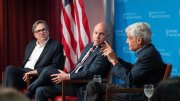The University Center for Ethics and the Professions was established in 1986perhaps the first of the current "interfaculty initiatives"to extend discussion of ethical issues from the realms of philosophy and theology to the practical concerns of public life. The center (www.ethics.harvard.edu) functions as a clearinghouse to bring together faculty members from Harvard and elsewhere to teach about and conduct research on ethical issues in public and professional life; offers academic fellowships; sponsors speeches and symposiums on subjects from stem cells and cloning to civil liberties and academic freedom; disseminates information on ethics-related courses; and, in general, connects people who want to discuss scholarship bearing on ethical issues across Harvard's schools.
Similarly, the University Committee on Human Rights Studies (www.humanrights.harvard.edu) acts as a faculty clearinghouse for research, in conjunction with human-rights programs at the schools of law, government, and public health (each of which has its own website, linked to the committee's Internet venue). The committee gathers course guides to help undergraduates examine issues such as health, development, gender, or the environment and rights issues; and works to foster student research opportunities.
These cooperative ventures mean that faculty members who have been working alone on some aspect of a problem may suddenly discover common cause with colleagues' research interests. Through the central websites, alumni can listen in on part of the conversation.





